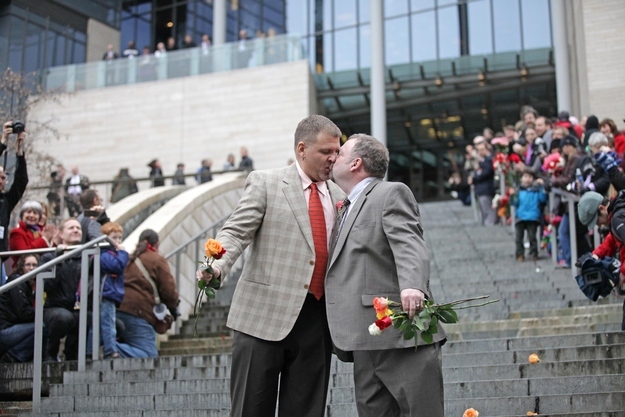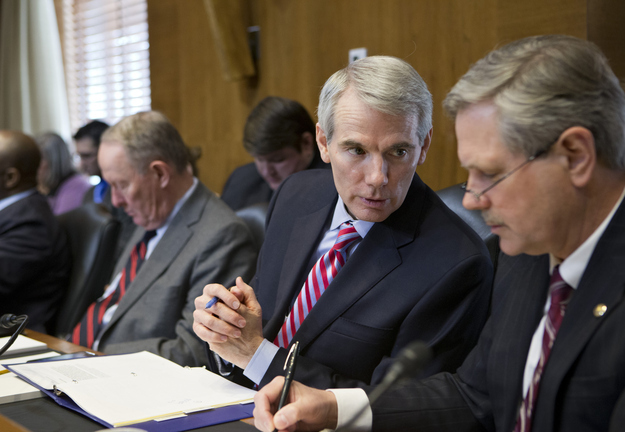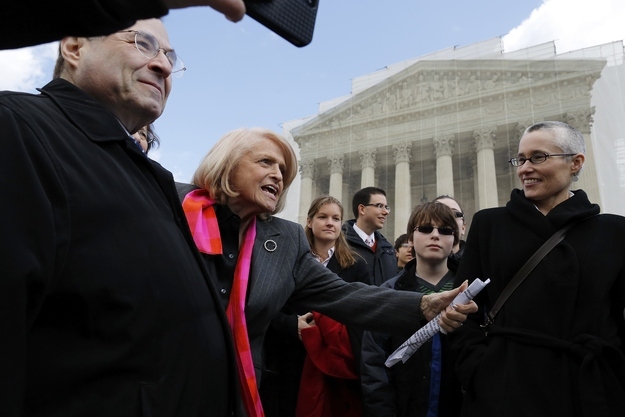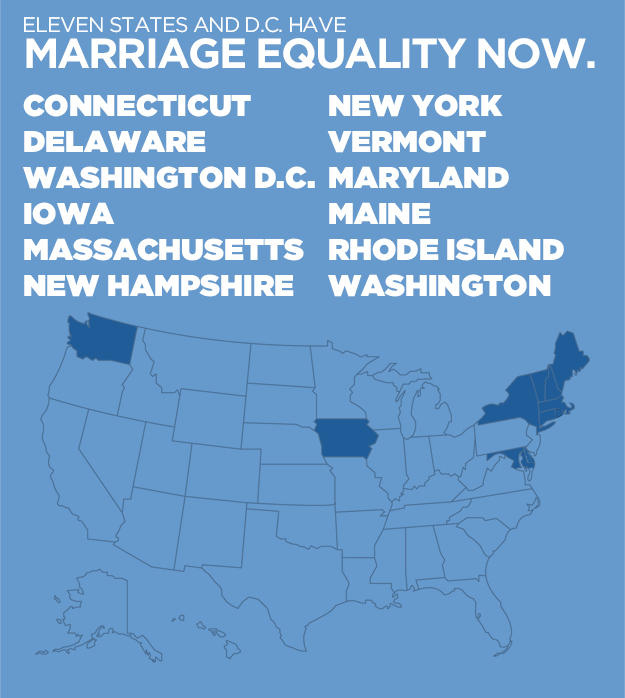
WASHINGTON — In a city exemplified by the Senate, where a majority vote can be a losing proposition, the tortured and extended path President Obama took to supporting marriage equality for same-sex couples was not unexpected.
What has been unexpected — even by many of the most prominent supporters of marriage equality — has been the path that both the president and the country have taken since Obama announced on May 9, 2012, "I think same-sex couples should be able to get married."
The opposite of gridlock, Obama's move — whether cause, effect or some combination of the two — was followed by the clearing of a pathway to significant movement for recognition of gay and lesbian couples' marriage rights in the year since.
On Wednesday, without noting the pending anniversary of Obama's announcement, White House press secretary Jay Carney noted simply that Obama views marriage rights for same-sex couples as "a fundamental issue of equal rights."
That simple statement was a far cry from a very long press briefing last year in which Carney spent most of his time attempting to deflect questions about Obama's views on marriage in the days in between Vice President Joe Biden's Sunday comments supportive of marriage equality on Meet the Press and Obama's Wednesday interview with ABC's Robin Roberts.
It even was a marked departure from the administration's initial reluctance to announce whether it would be supporting the plaintiffs seeking to have California's Proposition 8 ruled unconstitutional — although it eventually did side with them at the Supreme Court.
From a 2008 campaign opposing same-sex couples' marriage rights to a 2012 campaign supporting them as a personal matter but remaining agnostic as to whether couples had a constitutional right to marry, Obama now views marriage equality as "a fundamental issue of equal rights."
Although opposition remains, the country has moved right along with Obama on the once-divisive issue in five key ways.
The Party

In Charlotte, the Democratic Party formally endorsed marriage equality as part of its platform in September 2012. Although Obama was not the first to endorse its inclusion in the platform — House Minority Leader Nancy Pelosi was one of the first prominent elected officials to do so — his announcement on May 9, 2012, all but sealed the deal for its inclusion.
Prior to Obama's evolution on the issue, several advocates saw the growing divide between the party's more liberal members and Obama on the issue as a potential sticking point at the convention.
With Obama on board, though, the measure was easily adopted, as were other pro-LGBT provisions.
The Voters

With Obama's endorsement in hand, voters in Maine, Maryland and Washington voted for marriage equality on Election Day 2012 — the first time any voters did so.
With same-sex couples marrying in all three of those states, the number of states with marriage equality jumped from six to nine.
Human Rights Campaign president Chad Griffin made the case for the changes the year had seen, saying, "This is a landmark election for marriage equality and we will forever look back at this year as a critical turning point in the movement for full citizenship for LGBT people."
Voters in Minnesota also rejected an amendment to ban same-sex couples from marriage, the first time that had happened since Arizona rejected an amendment in 2006 that would have banned same-sex couples from marrying or entering into civil unions.
And while voters in Arizona followed up by passing an amendment in 2008 solely focused on banning same-sex couples from marrying, lawmakers in Minnesota moved in the other direction, considering marriage equality in 2013.
The Lawmakers

Beginning with Ohio Sen. Rob Portman's announcement in March that he had "a change of heart" on the issue of same-sex couples' marriage rights, the floodgates opened for senatorial support for marriage equality.
Sens. Tom Carper of Delaware, Bob Casey of Pennsylvania, Kay Hagan of North Carolina, Claire McCaskill of Missouri, Jon Tester of Montana and Mark Warner of Virginia announced support. Alaska Sen. Mark Begich also issued one of his first public statements in support of marriage equality, although his office had previously told the Human Rights Campaign he supported marriage equality.
Portman was the only Republican in the Senate in support of marriage equality for a while, but he was soon joined by Sen. Mark Kirk of Illinois.
After that, Sens. Joe Donnelly of Indiana, Heidi Heitkamp of North Dakota, Tim Johnson of South Dakota and Bill Nelson of Florida also announced support for marriage equality, leaving Sens. Mary Landrieu of Louisiana, Joe Manchin of West Virginia and Mark Pryor of Arkansas as the only Democratic senators remaining opposed to marriage equality.
The Court

The Supreme Court, which upheld the constitutionality of criminal laws banning sodomy in 1986, appeared cautious about declaring a constitutional right that would strike down all bans on same-sex couples' marriages — but was nonetheless in a different world from 25 years earlier.
When looking at the constitutionality of California's Proposition 8 marriage amendment, for example, Justice Elena Kagan asked the lawyer defending the law, "You have sort of a reason for not including same-sex couples. Is there any reason that you have for excluding them?"
The next day the justices considered whether the Defense of Marriage Act's ban on the federal government recognizing same-sex couples' marriages is constitutional. Justice Ruth Bader Ginsburg assessed the situation bluntly, saying that, in states that allow same-sex couples to marry, DOMA set up "two kinds of marriage: the full marriage, and then this sort of skim milk marriage."
Even Chief Justice John Roberts — who was skeptical of the arguments against both laws — went so far as to say, "As far as I can tell, political figures are falling over themselves to endorse your side of the case."
The States

Finally, there was the recent flood of state movement.
On May 1, civil unions — though passed earlier this year — began in Colorado.
On May 2, the Rhode Island House passed and Gov. Lincoln Chafee signed the state's marriage equality bill.
On May 7, the Delaware Senate passed and Gov. Jack Markell signed his state's marriage equality bill.
And, on Thursday afternoon, the Minnesota House overwhelmingly approved its marriage equality bill, and the state Senate is expected to vote on and pass the bill on Monday. Gov. Mark Dayton supports the bill and has said he will sign it into law.
